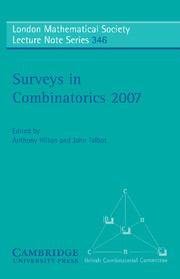Book contents
- Frontmatter
- Contents
- Preface
- 1 Hereditary and monotone properties of combinatorial structures
- 2 Ordering classes of matrices of 0's and 1's
- 3 Cycle decompositions of complete graphs
- 4 Excluding induced subgraphs
- 5 Designs and topology
- 6 The number of points on an algebraic curve over a finite field
- 7 On the efficient approximability of constraint satisfaction problems
- 8 The combinatorics of cryptographic key establishment
- 9 Bandwidth of graphic matroids
7 - On the efficient approximability of constraint satisfaction problems
Published online by Cambridge University Press: 16 March 2010
- Frontmatter
- Contents
- Preface
- 1 Hereditary and monotone properties of combinatorial structures
- 2 Ordering classes of matrices of 0's and 1's
- 3 Cycle decompositions of complete graphs
- 4 Excluding induced subgraphs
- 5 Designs and topology
- 6 The number of points on an algebraic curve over a finite field
- 7 On the efficient approximability of constraint satisfaction problems
- 8 The combinatorics of cryptographic key establishment
- 9 Bandwidth of graphic matroids
Summary
Abstract
We discuss some results about the approximability of constraint satisfaction problems. In particular we focus on the question of when an efficient algorithm can perform significantly better than the algorithm that picks a solution uniformly at random.
Introduction
The most famous problem in theoretical computer science is the question of whether the two complexity classes P and NP are equal.
Here P is the set of problems that can be solved in time which is polynomial in the size of the input. This is the mathematical definition aimed to correspond to problems which can be solved efficiently in practice on fairly large instances. One might object that there are very large polynomials but this has rarely been a problem and most problems known to be in P are efficiently solvable in the everyday meaning of the concept.
The class NP is the set of decision problems such that for instances with a positive answer there is a short proof of this state of affairs that can be verified efficiently. One of the most famous problems in NP is the traveling salesman problem, TSP, in which we are given n cites and distances d(ci, cj) between the cities. The task is, given an upper bound K, to find a tour that visits all the cities and returns to its origin and is of total length at most K. If there is such a tour then, given the tour, it is easy to verify that indeed it is of the desired quality. Formally “easy” should here be interpreted as computable in time which is polynomial in the input length.
Information
- Type
- Chapter
- Information
- Surveys in Combinatorics 2007 , pp. 201 - 222Publisher: Cambridge University PressPrint publication year: 2007
Accessibility standard: Unknown
Why this information is here
This section outlines the accessibility features of this content - including support for screen readers, full keyboard navigation and high-contrast display options. This may not be relevant for you.Accessibility Information
- 7
- Cited by
